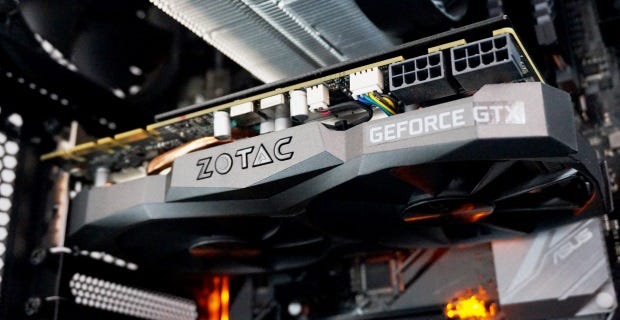Are graphics card prices finally starting to come down? GTX 1080s haven't been this cheap since Black Friday
Graphics a-go-go
Is it... is it nearly over? Has the time finally come when I can stand firm, brandish my credit card and... buy a new graphics card? After what seems like months, nay, years of over-exaggerated price inflation due to all of today's best graphics cards being like sweet, sweet honey to would-be cryptocurrency mining bandwagoners, graphics card prices might actually be starting to drop - and about time, too.
Case in point, you can currently get one of Gigabyte's Nvidia GeForce GTX 1080 cards for a mere £509 over on Amazon today, which, while not exactly is the same as its original RRP, is the cheapest it's been all year - and certainly the cheapest it's been since Black Friday when we rounded up all the best graphics card deals. Go forth while stocks last, brave graphics card upgraders.
It's not just Amazon that are starting to get more stock in at reasonable prices, either, as over the last few weeks Nvidia have been selling Founders Editions of its GTX 10-series cards straight off its own website for the first time in, well, ages. They're all gone now, of course (and we probably wouldn't recommend buying a Founders Edition anyway due to the lack of custom cooling and the increased clock speeds you'd find on a proper partner card), but it was the first sign that the status quo might just be about to turn in gamers' favour.
Indeed, take a quick look at online retailers like Amazon, Ebuyer and Newegg and you'll start to see a much healthier crop of prices starting to emerge. If that Gigabyte GTX 1080 doesn't take your fancy, for example, then how about this £495 Palit model or this £500 one that's also from Gigabyte?
There's also Zotac's mini version of the 6GB Nvidia GeForce GTX 1060 going for £270, and their mini Nvidia GeForce GTX 1070Ti currently available for £429, the latter of which is just £9 more than prices we saw over Black Friday.
Over in the US, you can pick up a mini 6GB GTX 1060 for as little as $290 (around $50 more than it was over Black Friday), or a full-sized version for $330. Alternatively, you can save around $30 by opting for a 3GB model, but really I'd recommend spending the extra for the 6GB version.
You'll still have to pay a bit of a premium for something a bit beefier, mind, as Nvidia GeForce GTX 1070 cards are still around $100 more than what they cost over Black Friday, but the cheapest one I've seen so far is this $500 model from EVGA.
The GTX 1080 still costs around $100 more than it did on Black Friday as well, but $620 for a triple-fan MSI model (or even $610 for a dual-fan EVGA) is no doubt a much sweeter figure than it has been in recent months.
However, (there's always a 'however', isn't there?) just before you rush off into the sunset with your new crate load of GPUs, consider this one crucial bit of information: it's been hotly tipped for some time now that Nvidia are about to release a new crop of graphics cards in the very near future, which according to the absolutely accurate establishment known as 'The Rumour Mill' are currently codenamed RTX.
These supposed GTX 20-series graphics cards (i.e: the GTX 2080, or GTX 2070) will no doubt be a lot more powerful than the current 10-series, so now may not actually be the best time to buy one after all. Then again, whenever these graphics cards end up launching - current estimates say around September, October time - there's an increased likelihood that they'll cost a lot more than these cards currently do at the moment, so you may well be doing yourself a favour by grabbing a bargain now.
Who knows, basically. It's a tough call, no matter what you decide to do. Should you buy one now while prices are relatively sane and save yourself the trouble of getting a new Turing card at launch, or is it even worth waiting until Black Friday 2018 to try and nab yourself a bargain then? It all rather depends on how much your current PC needs upgrading, how much cash you've got to burn, and whether you can stomach the idea of waiting any longer.

